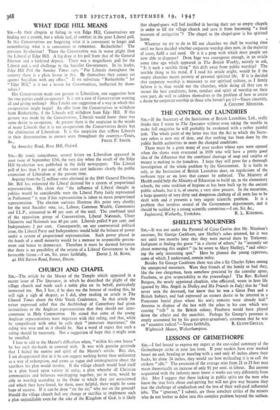CHURCH AND CHAPEL SIR, —The article by the Master of the
Temple which appeared in a recent issue of The Spectator, in which he described the plight of the village church and made such a noble plea on its behalf, particularly interested me. But, I fear, if he does me the honour of reading this, he will sigh a sigh of despair, as I did, after reading an article in The Church Times about the Oslo Youth Conference. In that article the writer expressed relief that the Archbishop of' Canterbury had given instructions to the Anglican representatives that they should not inter- commune in Holy Communion He stated that some of the young Anglican representatives were impatient with this ruling, and that, while he sympathised with what he calls their "immature impatience," the ruling was wise and as it should be. Not a word of regret that such a ruling should be necessary. Not a suggestion of hope that it might soon be annulled.
I hate to add to the Master's difficulties when, "within his own house" he has such die-hards to contend with. It was with genuine gratitude that I hailed the motive and spirit of the Master's article. But, alas, I am disappointed that in it he can suggest nothing better than uniformity as a way of redemption, and seems so vague and unimaginative about the sacrifices his plan would involve. If the village church would lend itself to a plan based upon variety in unity, a plan whereby all Christian communities and believers worshipping together, yet in turn, would be able to worship according to the Order to which they are accustomed and which they have found, for them, most helpful, there might be some hope of success. If it can be done "on the air," why not on the ground? Should the village church feel any change or sacrifice to implement such a plan unjustifiable even for the sake of the Kingdom of God, is it likely that chapel-goers will feel justified in leaving their not so empty chapels in order to fill the village church and save it from becoming "a local museum of antiquities "? The chapel to the chapel-goer is his spiritual
home. a
Whatever we try to do to fill our churches we shall be wasting time until we have decided whether corporate worship does now, in the majority of cases fulfil a real need. Or is it a prop with which most people are now able to dispense? Dean Inge was courageous enough, in an article some time ago which appeared in The British Weekly, naively to ask, "Is it such a terrible thing" this drift away from public worship? The terrible thing to his mind, if I read his article aright, would be if the empty churches meant poverty of personal spiritual life. If it is decided that corporate worship is necessary to our spiritual culture, as I firmly believe it is, then would not the churches, while doing all they can to secure the best conditions, form, conduct and spirit of worship on their own part, do well to address themselves to the problem of how to create a desire for corporate worship in those who haven't got it?—Yours sincerely,
A COUNTRY MINISTER.


































 Previous page
Previous page